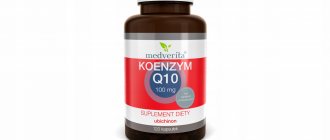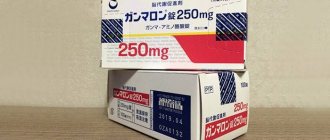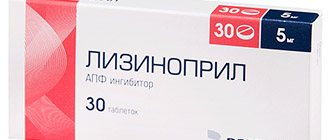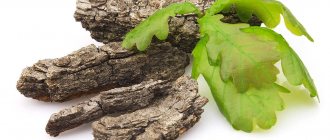A dry, obsessive cough often accompanies respiratory diseases. It can also occur due to allergies, stress, or exposure to irritating substances. Thanks to this protective reaction, the body tries to get rid of viruses, bacteria or dust.
When the cough becomes continuous and painful, taking a medicine that suppresses the cough reflex, for example, Omnitus, is indicated. This group of drugs should be taken with caution to avoid complications.
Compound
| Modified-release film-coated tablets | 1 table |
| active substance: | |
| butamirate citrate | 20 mg |
| excipients: lactose monohydrate - 218.5 mg; hypromellose - 70 mg; talc - 10 mg; magnesium stearate - 8 mg; colloidal silicon dioxide anhydrous - 2 mg; povidone - 1.5 mg | |
| film shell: hypromellose - 5.105 mg; talc - 4.7 mg; ethylcellulose - 3.14 mg; macrogol - 1.253 mg; titanium dioxide - 1.041 mg; dye “Sunset” yellow (E110) (11%) - 1.261 mg |
| Modified-release film-coated tablets | 1 table |
| active substance: | |
| butamirate citrate | 50 mg |
| excipients: lactose monohydrate - 230.5 mg; hypromellose - 85 mg; talc - 10 mg; magnesium stearate - 12 mg; colloidal silicon dioxide anhydrous - 6 mg; povidone - 1.5 mg | |
| film shell: hypromellose - 5.305 mg; talc - 4.95 mg; ethylcellulose - 3.183 mg; macrogol - 1.273 mg; titanium dioxide - 1.061 mg; crimson dye (“Ponso” 4R) (E124) - 2.122 mg; brown varnish (sunset yellow dye (E110), azorubine dye (E122), black dye (E151) - 0.106 mg |
| Syrup | 1 ml |
| active substance: | |
| butamirate citrate | 0.8 mg |
| excipients: sorbitol 70% (non-crystallizing) - 405 mg; glycerol - 290 mg; sodium saccharinate - 0.6 mg; benzoic acid - 1.15 mg; vanillin - 0.6 mg; anise oil - 0.15 mg; ethanol 96% - 3 µl; sodium hydroxide - 0.1 mg; purified water - up to 1 ml |
Description of the drug
Omnitus is sold in three dosage forms:
- tablets that contain 50 or 20 mg of butamirate citrate;
- syrup, 1 ml of which contains 0.8 mg of butamirate citrate;
- drops, 1 ml contains 5 mg of butamirate citrate.
The tablets have a round shape, a special yellow or orange coating. Packed in blisters of 10 pieces.
The syrup can be purchased in 200 ml bottles complete with a measuring spoon and instructions for use. It is a clear, colorless or slightly yellowish liquid with a vanilla aroma.
Drops are sold in 20 ml bottles equipped with a dosing device. They are a solution with a specific odor without color or with a slight yellow tint.
Pharmacokinetics
Absorption is high. After oral administration of syrup at a dose containing 150 mg of butamirate citrate, Cmax in plasma of the main metabolite (2-phenylbutyric acid) is observed after 1.5 hours and is 6.4 mcg/ml, when taking a modified-release tablet (50 mg) - 9 h and 1.4 μg/ml, respectively. T1/2 for syrup - 6 hours, for tablets - 13 hours. There is no cumulative effect. Butamirate citrate is rapidly hydrolyzed in plasma to 2-phenylbutyric acid and diethylaminoethoxyethanol. Both of these metabolites, which also have an antitussive effect, are significantly bound to plasma proteins, which explains their long-term presence in the plasma. Subsequently, the main metabolite 2-phenylbutyric acid is oxidized to 14C-p-hydroxy-2-phenylbutyric acid. All three metabolites are excreted by the kidneys, with the acidic metabolites being primarily glucuronic acid.
How does Omnitus work?
The therapeutic effect of the drug is due to the properties of the main active ingredient - butamirate, which is a centrally acting anti-cough agent.
Therefore Omnitus:
- directly affects the cough center and blocks debilitating coughing attacks;
- does not cause attachment or addiction;
- gives a bronchodilator effect;
- facilitates the breathing process;
- increases oxygen content in the blood.
The medicine does not depress respiratory function, does not have a sedative effect, and does not contribute to the retention of sputum in the bronchi.
Directions for use and doses
Inside. The tablets are taken before meals without chewing.
Tablets, 20 mg
Adults - 2 tables. 2–3 times a day; children over 12 years old - 1 table. 3 times a day; from 6 to 12 years - 1 table. 2 times a day.
Tablets, 50 mg
Adults - 1 table. every 8–12 hours
Syrup
Adults - 6 scoops (30 ml) 3 times a day; children over 9 years old (40 kg) - 3 scoops (15 ml) 4 times a day; from 6 to 9 years (22–30 kg) - 3 scoops (15 ml) 3 times a day; from 3 to 6 years (15–22 kg) - 2 measuring spoons (10 ml) 3 times a day.
Contraindications for use
The drug is not prescribed for hypersensitivity to any of the substances included in the tablets, drops or syrup.
Also contraindicated are:
- period of lactation and breastfeeding;
- for tablets with a dosage of 50 mg – age up to 18 years;
- for tablets with a dosage of 20 mg – preschool age;
- for tablets – impaired absorption of monosaccharides in the gastrointestinal tract, lactose intolerance, lactase deficiency;
- for drops – age up to two months;
- for syrup – age up to three years.
Since the syrup contains ethanol, it is prescribed with caution to persons with liver pathologies, brain diseases, alcohol dependence, epilepsy, who are prone to developing dependence on medications.
Release form
Omnitus is available in modified-release film-coated tablets with a dosage of the active substance of 20 or 50 mg, yellow or orange in color, round biconvex shape, and also in the form of syrup.
- The tablets are packaged in PVC or aluminum blisters of 10 pieces, there is 1 blister in a cardboard box, while the syrup is sold in 200 ml bottles made of dark glass, sealed with a plastic cap and tamper evident.
- The syrup is supplied with a 5 ml measuring spoon with a 2.5 ml line. One cardboard box contains 1 bottle.
Special instructions, side effects
Omnitus is approved for use in patients with diabetes mellitus, as it contains sorbitol and saccharin.
Simultaneous use with expectorants is prohibited in order to prevent stagnation of sputum in the bronchi, which can cause bronchospasm and the development of an infectious process in the lungs.
The medicine may cause drowsiness and dizziness, so caution should be exercised in activities that require increased alertness or speed of reaction.
In some cases, during treatment, undesirable effects may occur in the form of nausea or diarrhea, allergic reactions, itching, dizziness, urticaria, and various skin rashes.
Omnitus is stored at a temperature of 15-25°C, tablets - for two years from the date of release, syrup - five years, drops - two and a half years.
Omnitus prescription schemes
The dosage and frequency of administration are determined depending on the patient’s age, type of drug and indications.
In accordance with the instructions for use of Omnitus tablets, the medication is not chewed and taken before meals.
Take 1 tablet 50 mg 2-3 times a day.
Tablets 20 mg - adults, 2 pieces 2-3 times a day, children from 6 to 12 years old - 1 piece 2 times a day, from 12 years old, 1 piece 3 times a day.
Syrup is taken in volumes by age:
- children 3-6 years old – 10 ml three times a day;
- children 6-9 years old – 15 ml three times a day;
- children over 9 years old – 15 ml four times a day;
- adults – 30 ml three times a day.
Drops are prescribed to children four times a day:
- from two months to a year – 10 drops;
- from one to three years – 15 drops;
- from three years - 25 drops.
If symptoms persist for more than a week, you should consult your doctor.
Price, where to buy, reviews
The price of Omnitus depends on the dosage form, the pricing policy of the pharmacy chain, and the region of sales. Tablets start from 225 rubles. for 10 pieces, syrup - from 230 rubles, drops - from 290 rubles. It is more convenient to buy medicine on the pharmacy website.
According to patient reviews, the drug works well for paroxysmal coughing at night, against the background of throat irritation caused by ARVI. There is a variety of dosage forms, an affordable price, and a minimal number of side effects.
Doctors consider Omnitus a modern and effective drug recommended for lingering dry cough.
special instructions
A standard single dose of 10 ml syrup contains 0.03 ml of ethanol, which should be taken into account when prescribing the drug to patients with liver or brain diseases, alcoholism , epilepsy , since treatment may pose a health hazard.
When treating with Omnitus, you should not prescribe drugs that can depress the central nervous system, for example: tranquilizers , sleeping pills , antipsychotics . In addition, patients should refrain from drinking alcohol.
Omnitus price, where to buy
On average, the price of Omnitus syrup is 145-170 rubles.
Tablets with a dosage of 20 mg cost 120-260 rubles (10 tablets per package), while 50 mg costs 230-250 rubles (10 tablets).
- Online pharmacies in RussiaRussia
ZdravCity
- Omnitus tablets 20 mg 10 pcs. Hemofarm A.D.
RUB 252 order - Omnitus syrup 0.8 mg/ml 200 ml Hemofarm A.D.
RUB 279 order
- Omnitus drops for oral administration 5 mg/ml vial. 20ml (from 2 months) Nizhpharm JSC RU
RUB 291 order
Instructions for use of Omnitus (Method and dosage)
The drug must be taken orally, without chewing, before meals.
According to the instructions for use of Omnitus tablets , their use depends on the age of the patient:
- 20 mg – adults should take 2 tablets. 2 or 3 times a day, patients aged 6-12 years are prescribed 1 tablet. twice a day, from 12 years old, 1 tablet three times a day;
- 50 mg - adults are recommended to take 1 tablet every 8-12 hours.
Instructions for use of Omnitus syrup suggest using a 5 ml measuring spoon. The dosage is different for different age categories:
- adults and elderly people - 30 ml (corresponds to 6 measuring spoons) 3 times during the day;
- from 9 years (child weight 40 kg) - 15 ml (corresponds to 3 measuring spoons) 4 times during the day;
- 6-9 years (weight 22–30 kg) - 15 ml (corresponds to 3 measuring spoons) 3 times during the day;
- 3-6 years (weight 15-22 kg) - 10 ml (corresponds to 2 measuring spoons) 3 times during the day.
Reviews about Omnitus
Numerous reviews of Omnitus tablets as an antitussive drug indicate the effectiveness, demand and availability of this product. However, many use it in combination and note some negative aspects, expressing themselves as follows: “It helps, I stopped drinking - the cough appeared again,” “Why are dyes needed in medicines? They only cause harm."
Reviews about the syrup are positive; many people like its pleasant smell and taste, the possibility of using it for children, and its affordable price.
Pharmacodynamics and pharmacokinetics
Omnitus is a centrally acting antitussive drug. The active substance has no chemical or pharmacological similarity to opiates and acts directly on the cough center , which has an expectorant, moderate bronchodilator and anti-inflammatory effect, improves spirometry (external respiration tests) and blood oxygenation .
Pharmacokinetics
- Absorption : absorption is high. Taking 150 mg of syrup can cause a maximum plasma concentration of the main metabolite - 2-phenylbutyric acid - 6.4 μg/ml after 90 minutes, 50 mg tablets - after 9 hours - 1.4 μg/ml.
- Metabolism : hydrolyzed in plasma to 2-phenylbutyric acid and diethylaminoethoxy-ethanol . Next they bind to plasma proteins , then the main metabolite undergoes oxidation. The drug does not accumulate in the body.
- The half-life of butamirate citrate when taking syrup is 6 hours, when taking 50 mg tablets - 13 hours. Excretion occurs through the kidneys. Acidic metabolites are eliminated primarily as glucuronides .








